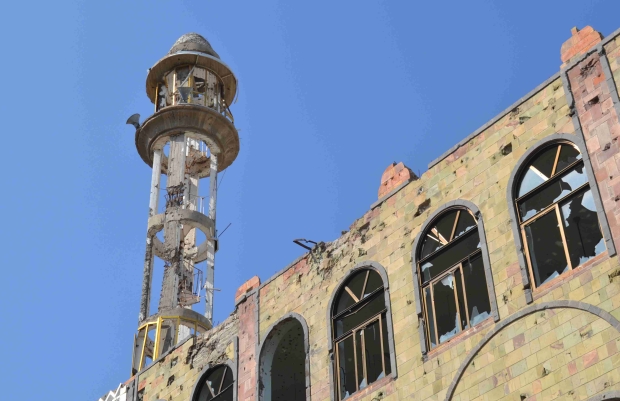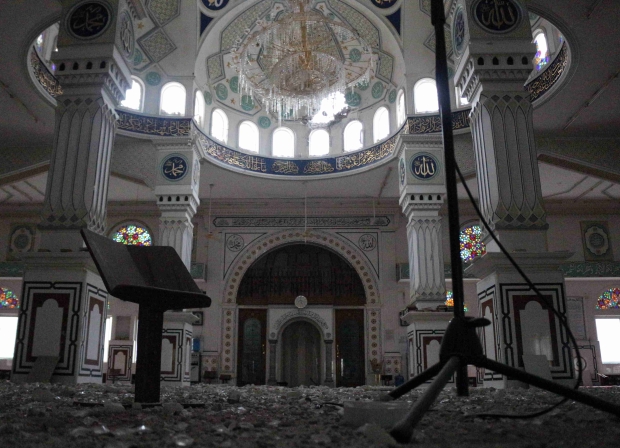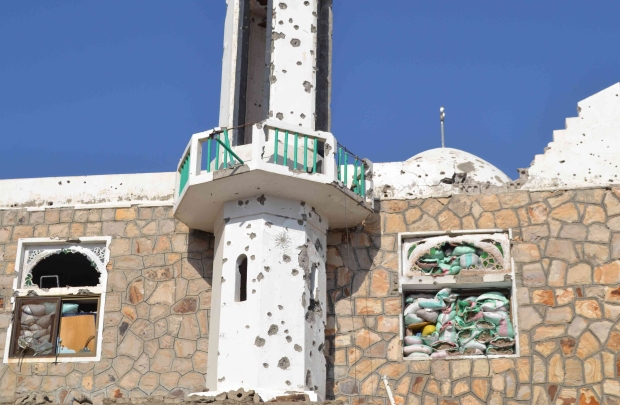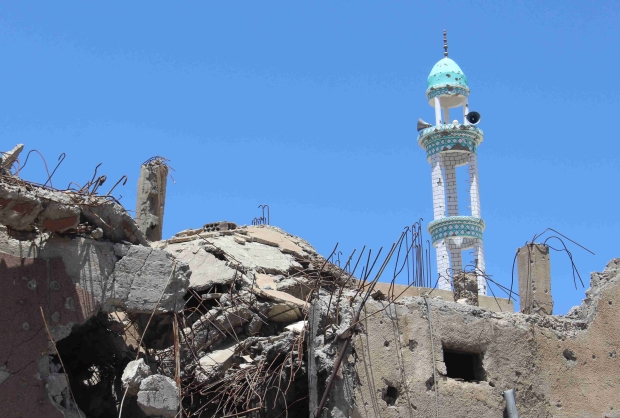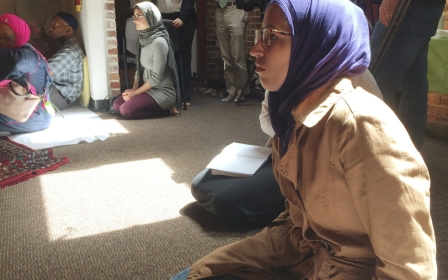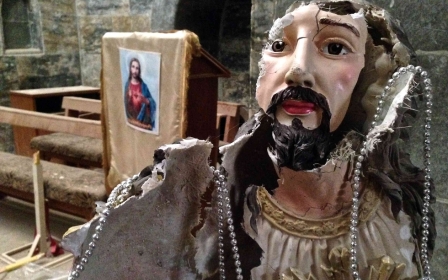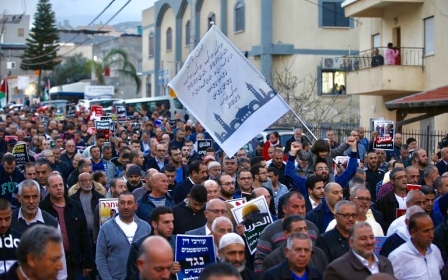Shelled and burnt out: The mosques wrecked by war in Yemen
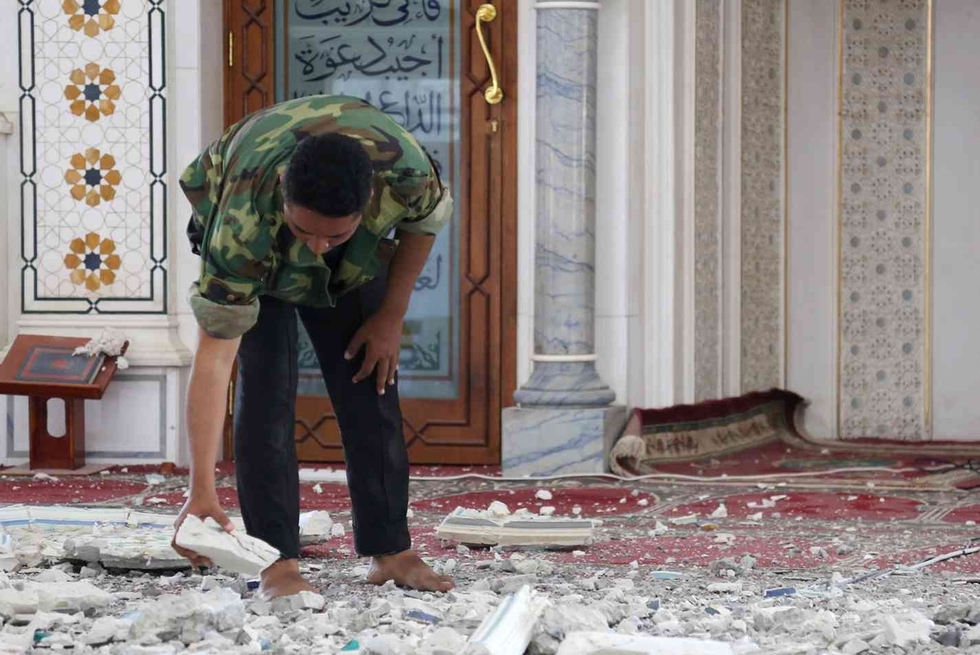
TAIZ, Yemen – Najeeb al-Raseni works in a cafe near al-Hussein mosque in the northern al-Shamasi area of Taiz city. He prays every day: he believes that this world is mortal, that the hereafter is immortal and that he should work hard to go to heaven.
Raseni used to worship regularly at al-Hussein – but not any more.
When the war broke out in his district in April 2015, he continued attending the mosque. But in early May 2015, the Houthi rebels entered the building and turned it into a barracks.
In mid-May 2015, pro-government forces recaptured the mosque - but then the Houthis targeted the building.
"No one can enter the mosque nowadays because it overlooks the Houthis' positions," explains Raseni. "I tried to enter the mosque but a Houthi sniper fired on it, so I immediately left."
Dozens used to pray at al-Hussein alongside Raseni. Most now pray at home because other mosques are too far to travel for prayer five times a day.
I tried to enter the mosque but a Houthi sniper fired on it, so I immediately left
- Najeeb al-Raseni
But Raseni still attends other mosques to seek more reward from Allah.
"The destruction of mosques is clear evidence that both of the warring sides are wrong and that war is futile," he says.
"The real Muslim will not target mosques, even if his enemies are inside it. I am against the warring sides that destroy our mosques."
Mosques used to house troops
Al-Hussein is one of 52 mosques in Taiz province that has shut since war broke out in 2015. Often it is because they happen to be in a conflict zone, have been turned into barracks for fighters or been reduced to rubble.
Mosques are core to life in Yemen, where Islam is the faith for 99 percent of the population. Some worshippers gather at their local mosque five times a day to pray. Muslims also meet at the weekend to hear the Friday sermon, when preachers discuss the issues of the week from a religious perspective.
"Our mosque became a barracks and that means war defiled it and it is not a holy place now," Mutahar says. "But this does not mean we do not pray. Rather, I pray more than before but at home."
Our mosque became a barracks and that means war defiled it and it is not a holy place now. But this does not mean we do not pray
- Akram Mutahar
For him, the destruction of his mosque has made him focus on one hadith - or collected saying - of the Prophet Mohammed, which he quotes: "There will come a time upon my ummah [Muslims] in which the one holding on to his deen [religion] is like the one holding on to a hot piece of coal from the fire."
Mutahar explains that he and other Muslims draw comfort in this particular hadith, spoken by the Prophet Mohammed more than 1,400 years ago. Despite war making worship as challenging as "holding on to a hot piece of coal", he has not given up on practicing his faith, even if only at home.
Zaid al-Showafi, the imam of the Oqba mosque, agrees with Mutahar that, amid conflict, Muslims should still look to hadiths and verses in the Quran for comfort.
"I advise people not to stop going to mosques because of destruction. My job was as an imam. Nowadays I am unemployed but I have not left mosques as this is worship and not work."
He explains that, like many in Taiz city, he now depends on organisations and relatives to provide him with food.
"Nowadays, the number of worshippers at mosques is more than before the war. This is because the preachers and imams comfort people to be patient amid the war."
Fighters justify destruction
The attacks on mosques have also drawn protests. The Program of Communication with Yemen's Scholars is a pro-government NGO which coordinates with religious sheikhs. On 11 April, it organised demonstrations in Taiz, Marib and Aden provinces against the targeting of mosques.
The protest organisers only condemn the Houthi fighters, who it says have destroyed more than 750 mosques across Yemen - despite the fact that pro-resistance forces have also been responsible for some of the damage.
"When the imam of the mosque asked us to protest against the Houthis, I did not hesitate to participate," said the man, who did not wish to give his name for fear of reprisals. "My purpose is not to support the other side that destroys mosques. I want to send a message to the world to protect mosques."
Showafi and other imams tell MEE that they have tried to contact the warring sides to stop the destruction – but without success.
Fighters tell them, the imams say, that they cannot discriminate between houses and mosques; also they cannot ignore a place of worship if it is being used as a barracks.
I know it is not right to destroy a holy place, but the end justifies the means and our aim is stop the killing of civilians by the Houthis
- Pro-resistance fighter
MEE tried to contact a source from the Houthis in Taiz city for a response to the accusations against them but no one was willing to comment.
But a fighter for the popular resistance says it did not destroy mosques deliberately.
"I know it is not right to destroy a holy place, but the end justifies the means," says the fighter, who did not wish to give his name for fear of reprisals. "Our aim is stop the killing of civilians by the Houthis. So I do not feel bad destroying a holy place that can be reconstructed later.
"Allah will forgive any wrong behaviours because He knows that our main aim is obedience to Him."
'Killing civilians is worse'
Sabri Aqlan, the religious sheikh in Taiz city, told MEE that, in the eyes of Islam, killing a Muslim is worse than destruction of the Kaaba and mosques. It is only to be expected, he says, that fighters who kill civilians will also destroy mosques.
"In Islam, the destruction of mosques or even talking about self-interest at a mosque, is a sin. Mosques are holy places where people pray to Allah, but killing civilians is a worse sin and the punishment in the hereafter will be worse."
Mosques are holy places where people pray to Allah, but killing civilians is a worse sin and the punishment in the hereafter will be worse
- Sabri Aqlan, religious sheikh
For his part, Raseni says he cannot wait for the mosques to be rebuilt – but fears that it may take some time.
"The destruction of mosques is a real test for good Muslims, as good Muslims do not stop praying," he says. "Rather they realise that this is a test and they kept praying to Allah.
"Islam is a comfort to us and the best place to pray to Allah is at mosque. If all of us pray to Allah to help Yemen, Allah will help us."
This article is available in French on Middle East Eye French edition.
New MEE newsletter: Jerusalem Dispatch
Sign up to get the latest insights and analysis on Israel-Palestine, alongside Turkey Unpacked and other MEE newsletters
Middle East Eye delivers independent and unrivalled coverage and analysis of the Middle East, North Africa and beyond. To learn more about republishing this content and the associated fees, please fill out this form. More about MEE can be found here.


